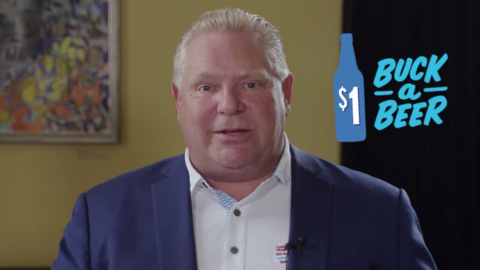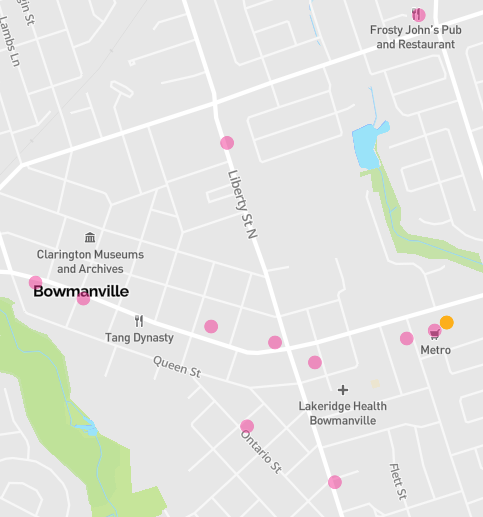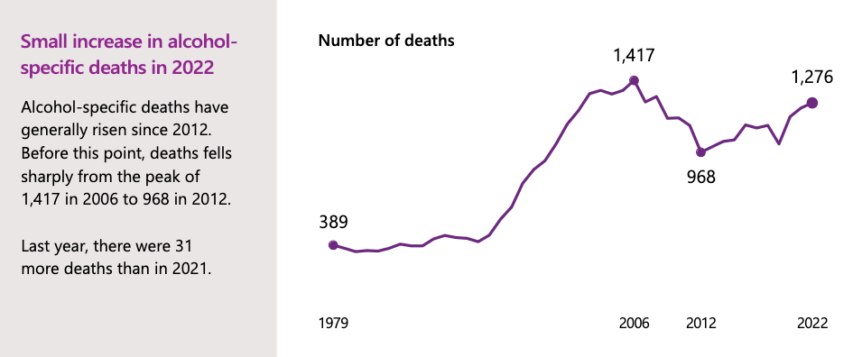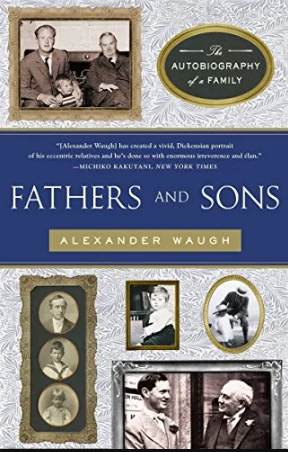[Bertie Wooster, who has a terrible hangover, encounters a prospective new valet – Jeeves.]
“If you would drink this, sir,” he said, with a kind of bedside manner, rather like the royal doctor shooting the bracer into a sick prince. “It’s a little preparation of my own invention. It is the Worcestershire sauce that gives it its colour. The raw egg makes it nutritious. The red pepper gives it bite. Gentlemen have told me they have found it extremely invigorating after a late evening.”
I would have clutched at anything that looked like a lifeline that morning. I swallowed the stuff. For a moment I felt as if someone had touched off a bomb inside the old bean and was strolling down my throat with a lighted torch, and then everything seemed suddenly to get all right. The sun shone in through the treetops and, generally speaking, hope dawned once more.
“You’re engaged!” I said, as soon as I could say anything.
P.G. Wodehouse Carry on, Jeeves (1925).
April 1, 2025
QotD: Jeeves proves his talent for the first time
March 10, 2025
QotD: The “Basic College Dude” of the 2020s
… though I have written probably 50,000 words on the Basic College Girl over the years, I have spent almost no time on her opposite number, hereby christened the Basic College Dude (BCD). Admittedly some part of this is structural: There just aren’t that many Persyns of Penis in college these days — nationwide, college enrollment is something like 65% female and climbing; I bet there are more than a few small colleges that, while technically coed, are almost exclusively female. Also, I taught mostly freshman-level History classes, and since I was one of the few dinosaurs who didn’t make attendance a part of the class grade, only the congenital rule-followers, i.e. chicks, showed up.
But mostly it’s just because none of them stick in my memory. The #1 characteristic of the Basic College Dude is that even if he’s there, he’s not there. He’s checked out — mentally, emotionally, spiritually (if that even means anything anymore). Unlike the girls, all of whom seem to be in 72 different clubs and organizations (and list them all on their email auto-signatures, such that by junior year, their honorifics are longer than my entire resume), the guys don’t seem to do much of anything. How do they while away their hours? I assume with social media, like everyone, and with video games and blackout drinking …
… the latter of which I have seen, a lot, and if you’ll permit a brief digression, if you really want to know how fucked our society is, go to a student bar on a Friday night. I myself was a bit of a party animal in college, and like everyone I went over the line a few times, but college kid drinking these days is almost Soviet — they’re aiming to get knee-walking, gutter-puking, total-blackout shitfaced, and they set about it as grimly and efficiently as possible. The girls, too, with the added bonus that they’re all on Ambien and Klonopin and every other happy pill you’ve ever heard of, which makes for some interesting, by which I mean terrifying, behavior …
[…]
But mostly it’s because college dudes have had their libidos beaten out of them. […]
Not only does the BCD not know how to do this, as Nikolai says, he apparently doesn’t actually want to. Constant stimulation by blinking screens, shit diets, and a lifetime of indoctrination have reversed the sexual dilithium crystals. Heartiste used to go on about this, and while I’m no biochemist, either, I think his theory is sound: There’s so much environmental estrogen floating around that men develop the emotional equivalent of gynecomastia, while women turn butch. Throw nth wave feminism into the mix, and you’ve got women acting like the crudest, most obnoxious male stereotypes (they call this “being strong and empowered”), while the men mope and sigh to their diaries.
The end result is that the BCD walks around like he’s shellshocked. He does the bare minimum, hoping to just grind it out without any further affronts to his basic human dignity … but so mal-educated is he, that the phrase “basic human dignity” doesn’t even register with him.
Severian, “The Basic College Dude”, Founding Questions, 2021-10-05.
January 22, 2025
Discover the ‘Lost’ Big Dipper Rum Cocktail Recipe
Glen And Friends Cooking
Published 2 Oct 2024Today on Cocktails After Dark we explore the fascinating history of Gander Airport’s iconic Big Dipper bar, once a bustling stopover for the world’s rich and famous during the 1940s to 1960s. This video dives into the golden age of aviation when propeller planes made Gander, Newfoundland, a key refuelling point for transatlantic flights. Discover how legends like Marilyn Monroe, Winston Churchill, and Frank Sinatra sipped cocktails at the Big Dipper while planes refuelled, and learn how to make the bar’s signature cocktail using the infamous Newfoundland Screech rum. If you’ve ever been curious about Gander’s aviation history, old-time airport bars, or unique cocktails, this video has it all. Plus, find out how “Screech” became a part of Newfoundland’s folklore. Whether you’re a history buff, cocktail enthusiast, or simply curious about this legendary airport, you won’t want to miss this journey back in time. Grab your shaker, some rum, and let’s make history — one drink at a time!
The Big Dipper
1½ ounces Newfoundland Screech
1 ounce Cointreau
¾ ounce lemon juice
1 teaspoon simple syrup
(more…)
January 18, 2025
Incentives matter even to “objective” scientists
A 2019 Canadian “study” ideally illustrates that scientists are just as human as anyone else where they are incentivized to provide “desired” outcomes:
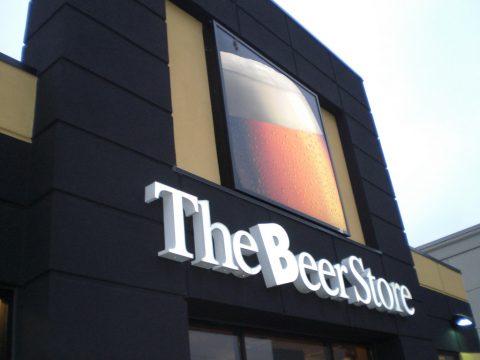
“The Beer Store” by Like_the_Grand_Canyon is licensed under CC BY-NC 2.0
Earlier this year, a major Canadian study on alcohol policy provided an excellent illustration of this. As news headlines across the country reported, 16 scientists and researchers at various universities and institutions had, through their Canadian Alcohol Policy Evaluation, shown that provincial governments are “failing to address alcohol problems”.
The scientists evaluated provincial government policies and assigned a grade in the “D” range to seven of Canada’s 13 provinces or territories, while five received an “F”. The policy evaluation, however, was a curious one. Strangely, the policy evaluation did not evaluate whether government policies were beneficial to those who want to buy or sell alcohol.
Instead, provincial governments were evaluated more favorably if they devoted greater efforts toward afflicting buyers and sellers of alcohol through punitive taxes, price controls, heavy restrictions on the sale and marketing of alcoholic beverages, higher minimum legal drinking ages, and so on.
Even in the most restrictive markets, the researchers found that alcohol was too cheap, or that its purchase was too convenient, or that governments did not do enough to discourage or restrict its sale and consumption.
Predictably, and perhaps exemplifying Berlinski’s point on scientists grasping for government funds, the report authored by 16 scientists whose livelihoods involve raising public alarm about alcohol consumption concluded that there ought to be more government funding for public education on the dangers of alcohol consumption.
The report also advocated more government funding for bureaucracies to discourage drinking, more government funding for a lead organization to implement restrictive alcohol policies, more government funding for independent monitoring of such implementation, and more government funding to track and report the harm caused by alcohol consumption.
Like the CEO of a domestic automobile company insisting that tariffs against car imports — which would cause a massive wealth redistribution from consumers’ wallets into his own and those of the company’s shareholders — are in the national interest, the anti-drinking scientists insisted in the name of public health and wellness upon income redistribution from taxpayers and consumers to their own industry.
January 1, 2025
3,500 Years of Hangover Cures – Kishkiyya from Baghdad
Tasting History with Max Miller
Published 31 Dec 2024A slightly sour lamb stew with herbs, chickpeas, and fat, eaten as a hangover cure in 10th century Baghdad
City/Region: Baghdad
Time Period: 10th CenturyWhere there are hangovers, there are hangover cures. Throughout history they’ve varied from having a good wash, drinking lemonade while drinking alcohol, and the dubious prairie oyster. This stew is kind of like 10th century Baghdad’s version of my favorite hangover food: a greasy burger and fries.
Fatty lamb is stewed with kishka (a dried yogurt-like dairy product), verjuice, chickpeas, herbs, and greens, along with some olive oil just to make sure there’s enough grease involved. It doesn’t look all that pretty, but it tastes good. It’s complex and layered, with each flavor following the last, and the variety of textures is wonderful.
Wash 3 ratls meat and put it in a pot. Add ½ ratl chopped onion, ¼ ratl fresh herbs, a handful of chickpeas, 1 piece galangal, and ¼ ratl olive oil. Pour water to submerge the ingredients in the pot. Let the pot cook until meat is almost done. Add any of the seasonal green vegetables and a little chard. When everything in the pot is cooked, add 3 pieces of sour kishk, and ½ ratl kishk of Albu-Sahar, Mawsili, or Bahaki. Pound them into fine powder and dissolve them in 1 ratl (2 cups) ma’hisrim (juice of unripe sour grapes).
When kishk is done, add 2 dirhams (6 grams) cumin and an equal amount of cassia. Add a handful of finely chopped onion. Do not stir the pot. When the onion cooks and falls apart, add to the pot 2 danaqs (1 gram) cloves and a similar amount of spikenard.
Stop fueling the fire, let the pot simmer and rest on the remaining heat then take it down, God willing.
— Kitāb al-Tabīkh by ibn Sayyār al-Warrāq, 10th Century, translation from Annals of the Caliph’s Kitchen by Nawal Nasrallah
December 21, 2024
Alton’s Eggnog | Food Network
Food Network
Published 1 Dec 2014Alton’s making eggnog, the drink that thinks it’s a custard pie.
Get the recipe: http://www.foodnetwork.com/recipes/al…
(more…)
October 8, 2024
Making the Black Mead of Medieval France – Bochet
Tasting History with Max Miller
Published Jun 25, 2024Black mead, or bochet, made with spices and wood chips
City/Region: Paris
Time Period: 1393Mead was very popular from Russia to England, but started to lose favor in part due to the rise of cheaper brews like vodka and hopped ales. Mead was often still drunk for its medicinal properties, especially when it was infused with herbs and spices.
This mead has some of those wonderfully warming spices, and I added wood chips from the local brewing store to mimic the wood barrels that it would have been fermented in. The burnt caramel scent softens and mellows out during fermentation, and the resulting mead is not sweet at all and is more complex than many meads I’ve had.
To make six sextier of bochet, take six pints of very sweet honey, and put it in a cauldron on the fire and boil it, and stir for so long that it starts to grow, and you see that it also boils with bubbles like small blisters which will burst, releasing a little bit of dark smoke. Then add seven sextier of water and boil so much that it reduces to six sextiers, and keep stirring. And then put it in a vat to cool until it is lukewarm; then strain it through a cloth, and put it in a barrel and add a pint of yeast from ale, because that is what makes it piquant, (though if you use bread yeast, it makes as good a flavor, but the color will be duller), and cover well and warmly so it ferments.
If you want to make it very good, add an ounce of ginger, long pepper, grains of paradise and cloves in equal amounts, except for the cloves of which there should be the least, and put them in a cloth bag and toss it in. And when it has been two or three days and the bochet smells of spices and is strong enough, take out the bag and wring it out and put it in the next barrel that you make. And so this powder will serve you well up to three or four times.
— Le Ménagier de Paris, 1393.
September 8, 2024
The last dispatch from Toronto before the catastrophe began
Toronto, in fact all of Ontario, may no longer be there when you get up tomorrow morning. As Chris Selley explained in his brave, final communiqué from the doomed province:
Dear non-Toronto friends,
This city is in crisis. This may be my last communiqué before the telex goes down for good, and I feel honour-bound to tell the world of my city’s plight. If the worst should occur, which it almost certainly will, please tell our story.
The unthinkable has occurred: Doug Ford’s madmen and women at Queen’s Park have licensed hundreds upon hundreds of new locations — called “convenience stores”, in local parlance — to sell beer, wine, cider and pre-mixed cocktails.
They did this instead of fixing health care, if you can believe that. And, outrage upon outrage, the government even made a map of such locations — as if delivering fallen Ontarians one by one to Mr. Booze himself.
Why, within just a few hundred metres of where I write, through my tears, I can discern on the map more than five such new locations. There’s Mei Convenience, Mimi Variety, Lucy Grocery and Meat, Queen & Jarvis Convenience … the list goes on, and on, my God. Church attendance is reportedly soaring as Torontonians steel themselves for the forthcoming.
Ford’s government did this entirely to solicit corporate donations to his party (some say that’s actually illegal, but whatever) from his buddies at convenience-store empires 7-Eleven and Couche-Tard … and presumably from Mimi and Lucy, whoever they are. Very rich women, clearly.
Instead of fixing health care!
Until recently, some semblance of sanity prevailed: The nearest government-run liquor store to where I sit now is a 15-minute walk away; the nearest Beer Store, the privately owned former quasi-monopoly where you’re still supposed to return your bottles and cans, is nearer to 20 minutes.
And now, suddenly, a bottle or can is shockingly near to hand. And this will lead to more alcohol-related harms. Of this there is no doubt, as one expert recently told the Toronto Methodist Star: “Harm will increase in Ontario. That is straightforward.”
It is true that many jurisdictions around the world report similar or lower levels of alcohol consumption and related harms than Ontario despite having much greater access to retail alcohol — Italy, Greece, the United States — but that is not germane to this discussion. Ontarians are not like other people. Ontario is not like other places. We are worse. Or maybe better. Or some combination of the two.
It’s true! Even saintly Bowmanville has been sullied with the demon liquor thanks to Premier Ford’s diabolical plan:
July 14, 2024
When the Ontario Progressive Conservatives backed away from LCBO privatization
In the National Post, Terence Corcoran posts an excerpt from last year’s The Harris Legacy: Reflections on a Transformational Premier edited by Alister Campbell:
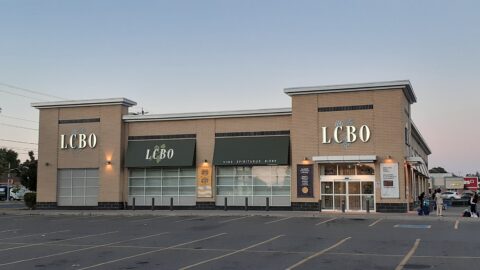
“LCBO at Parkway Mall” by Xander Wu is licensed under CC BY-SA 4.0 .
Almost 30 years ago, in 1995, the Ontario Progressive Conservative government led by Mike Harris promised to privatize the Liquor Control Board of Ontario (LCBO). “We will sell off some assets, such as the LCBO,” said the party’s famed election document, the Common Sense Revolution (CSR). The LCBO could have been a true privatization — a full-fledged divestiture of a government monopoly into a new open and competitive market, but it never happened.
The failure to privatize the LCBO, lamentable from a consumer and economic perspective, remains a significant lost opportunity to demonstrate the benefits of privatization. If Harris had successfully de-monopolized the alcohol market, the whole concept of privatization would have been given a major boost. Instead, the government backed away from privatization of the alcohol market, preferring instead to allow the corporation to substitute modern marketing and retail razzle-dazzle to give the false impression it was offering the public the best of all worlds.
The LCBO failure is also a demonstration of the degree to which the Common Sense Revolution’s starting principles fell short in grasping the essential benefits of private versus public ownership and control. Neo-liberalism isn’t exactly a fine science. The Wikipedia entry on “Neo-liberalism” is a 30-page effort (including 400 footnote links to hundreds of warring academic papers), reflecting an economic and ideological scramble that dates back more than a century. But when the Harris government came to power, major elements of the free-market model were often overshadowed by fiscal policy objectives. With the LCBO, the Harris government veered off the neo-liberal course in pursuit of standard political objectives.
In 1995, the LCBO was a government owned and operated province-wide corporation that controlled liquor and wine wholesale and retail markets. Another private monopoly player, the Beer Store chain, while owned and operated by the brewing industry, was also essentially a government-sanctioned beer monopoly. The CSR neo-liberal objective should have been to privatize the alcohol market by selling the LCBO, deregulating the Beer Store monopoly and allowing beer sales through supermarkets and even corner stores. More importantly, dismantling the LCBO would allow other corporations to enter the alcohol retail business and provide consumers much more choice, which has been the Alberta experience. Notably, Alberta achieved a successful and deregulated approach without sacrificing provincial revenues.
The neo-liberal objective of privatization is to benefit consumers and enhance economic productivity through competition. Instead, the Harris government fell into the fiscal policy trap that routinely captures politicians, bureaucrats and corporate insiders. Instead of aiming to benefit consumers, the objective soon became how to maximize the fiscal return to government. Never mind the consumer and the market. The objective became preserving — and enhancing — government revenues.
At the time, anti-privatization advocates frantically pointed at the Alberta experience of privatization of their provincial liquor monopoly, which (briefly) generated a lot of retail horror stories that Ontario newspapers gleefully republished (and, likely, emphasized out of proportion to the actual Alberta market). You can still hear Ontarians casting aspersions on the Alberta market as if nothing at all had changed after the initial rough patch. From what I’ve heard from Albertans, they have far wider choices of alcoholic beverages in stores much more conveniently sited with better open hours than anyone in Ontario enjoys. The Alberta government still gets at least as much in tax revenues from alcohol sales without needing to be in the distribution or retail business. It doesn’t seem to be the utter disaster that Ontario media portrays it to be … rather the contrary.
July 7, 2024
Ontario’s LCBO strike may be both justified and counterproductive
Ontario’s main importer and distributor of wine, beer, and spirits is now facing its very first actual strike, as the negotiators couldn’t come to an agreement by the strike deadline on Friday morning. On the face of the dispute, the union certainly has some solid grounds for the strike, as pay hasn’t been keeping pace with (official) inflation and far too many of the LCBO’s workforce are on work schedules that keep them from earning full-time wages. On the other hand, over the last decade or so, both Liberal and Progressive Conservative provincial governments have been making piecemeal changes to the market so that the LCBO is far from the only place Ontario drinkers can purchase their preferred booze. Just off the top of my head, here are some of the alternative options now available to Ontario consumers:

“LCBO at Parkway Mall” by Xander Wu is licensed under CC BY-SA 4.0 .
- The Beer Store, Ontario’s other (foreign-owned) booze oligopoly for beer and cider is still operating normally at all their retail locations and agency stores. They also have online ordering for delivery available to ordinary consumers.
- The LCBO is still offering online sales — not same-day, but free delivery.
- Ontario’s vast array of craft brewers are still able to sell individual cans or bottles of beer from their bottle shops or storefront locations (pre-packaged 6-, 12-, 24-container or other types are still limited to the Beer Store oligopoly, of course).
- Ontario’s wineries are similarly still operating normally for retail sales at the winery or (for a few older wineries who still have grandfathered privileges from earlier licensing regimes) stand-alone retail stores.
- Ontario’s much smaller — but growing — number of distilleries are also operating normally and are able to sell their locally produced whiskey, gin, vodka, etc. from their tasting rooms/bottle shops.
- Many, many grocery stores in the province now sell wine, beer, or both, and are all operating normally. They may be slower to replenish the shelves as the LCBO’s limited number of non-union staff will be handling re-supply.
In addition, if the strike continues for more than two weeks, the LCBO will open a select number of their stores for limited hours across the province (again, limited by the number of non-unionized staff available to operate the stores). With all of this (and I’m sure I’m missing some options in my list), consumers may begin to draw the conclusion that the LCBO isn’t as essential as it once was:
On Thursday evening, Colleen MacLeod, chair of the team bargaining on behalf of government liquor-store employees, declared the summer of 2024 utterly ruined.
“Tonight, (Premier Doug) Ford’s dry summer begins,” said MacLeod, of the Ontario Public Service Employees Union (OPSEU), hours before the first ever strike in the Liquor Control Board of Ontario’s (LCBO) history became official.
Desperate? Delusional? That’s up for debate. OPSEU’s press release announcing the strike suggests “delusional.” At one point it claims the LCBO is “Ontario’s best-kept secret.”
What could that possibly mean?
The release then quotes OPSEU president J.P. Hornick as follows: “We told Ford not to ruin everybody’s summer, but now he’s closed the Science Centre and forced a dry summer for Ontarians by refusing to offer a deal that would be good for LCBO workers and Ontario.”
The Ontario Science Centre is a tired old children’s destination in North Toronto that has been neglected in every way by consecutive provincial governments. I’m quite sure few people in Ottawa, Windsor or Thunder Bay have ever even heard of it. Mashing it together with the LCBO, just because OPSEU represents employees at both, suggests the union really doesn’t understand the fight it’s getting into.
If the Ford government is willing to dig in its heels and fight — which isn’t something it’s particularly known for — this could be a great win for the Ontario consumer.
It’s not 1990. The LCBO shutting the doors to its retail stores is really only a minor pain in the rear end, thanks to years of piecemeal, needlessly complex and and too-slow but nevertheless significant liberalization that really kicked into gear under former Liberal premier Kathleen Wynne. (Ford is often mocked for being obsessed with alcohol, but Wynne was nearly beyond parody. If her government woke up in a crisis Monday morning, it was safe to say she’d find herself announcing more beer and wine in supermarkets by Thursday afternoon.)
Anecdotally, as I was in on Thursday picking up a small selection of wine and beer, I overheard a conversation with one of the staffers and another customer where the staffer didn’t believe there’d actually be a strike and that the only result of the brinksmanship at the bargaining table would be that they would have to do more re-stocking next week after the (understandably) higher sales during the past week.
June 27, 2024
The Toronto Star wants Ontario to adopt Scottish booze regulation (but ignore the failure)
The Toronto Star always loves a good moral crusade, and if it also happens to fly in the face of whatever Premier Ford wants to do, then so much the better:
The Toronto Star is looking to Scotland to teach it how to reduce alcohol-related deaths. In an article titled “How Scotland started to kick its alcohol problem — and what Ontario could learn from it“, it pushes back on plans to liberalise Ontario’s state monopoly on alcohol retail, saying:
Ontario officials say they are fulfilling a 2018 election promise to increase “choice and convenience for shoppers and support Ontario retailers, domestic producers and workers in the alcohol industry”.
But Scotland has cut alcohol-related hospital admissions by 40 per cent and deaths by almost half. While in Ontario, alcohol-related admissions have risen by a third and deaths by almost half, according to the Canadian Centre on Substance Use and Addiction.
How did Scotland supposedly achieve this public health miracle?
The key part of Scotland’s landmark policy was aimed at reducing drinking by introducing minimum unit prices to make drinking more expensive.,/p>
Ontario already has minimum pricing and Scotland doesn’t have a state alcohol monopoly, so it is not obvious what lessons Ontarians are supposed to be learning, but put that to one side for a moment and consider the main claim.
Anyone who has been following events in Scotland knows that alcohol-specific deaths have risen since minimum pricing was introduced in 2018 and have generally risen since 2012 following a significant downturn in the years prior.
It is that drop between 2006 and 2012 that the Toronto Star must be referring to when it claims that deaths fell by “almost half” (actually a third). But the Scottish government didn’t pass any anti-alcohol legislation in those six years and it certainly didn’t have minimum pricing. The newspaper mentions that the drink-drive limit was cut, but that didn’t happen until 2014 and the evidence is clear that it had no effect on road accidents.
Since the Toronto Star doesn’t mention when the decline in alcohol-specific deaths took place, it is leading its readers to believe that it coincided with the introduction of minimum pricing and the lowering of the drink-drive limit. I call that lying.
It is strangely fitting that Canadians are being lied to about the “success” of Scotland’s alcohol strategy since the Scottish public were conned into accepting minimum pricing, in part, on the basis of lies told about the “success” of minimum pricing in Canada. The neo-temperance academic Tim Stockwell, who is quoted in the Star article, published a series of studies in the 2010s making some absurd claims about minimum pricing that were parroted by campaigners in the UK.
June 10, 2024
QotD: The British sweet tooth
It will be seen that British cookery displays more variety and more originality than foreign visitors are usually ready to allow, and that the average restaurant or hotel, whether cheap or expensive is not a trustworthy guide to the diet of the great mass of the people. Every style of cookery has its peculiar faults, and the two great shortcomings of British cookery are a failure to treat vegetables with due seriousness, and an excessive use of sugar. At normal times the average consumption of sugar per head is very much higher than in most countries, and all British children and a large proportion of adults are over-much given to eating sweets between meals. It is, of course, true that sweet dishes and confectionery – cakes, puddings, jams, biscuits and sweet sauces – are the especial glory of British cookery but the national addiction to sugar has not done the British palate any good. Too often it leads people to concentrate their main attention on subsidiary foods and to tolerate bad and unimaginative cookery in the main dishes. Part of the trouble is that alcohol, even beer, is fantastically expensive and has therefore come to be looked on as a luxury to be drunk in moments of relaxation, not as an integral part of the meal. The majority of people drink sweetened teas with at least two of their daily meals, and it is therefore only natural that they should want the food itself to taste excessively sweet. The innumerable bottled sauces and pickles which are on sale in Britain are also enemies of good cookery. There is reason to think, however, that the standard of British cookery – that is, cookery inside the home – has gone up during the war years, owing to the drastic rationing of tea, sugar, meats and fats. The average housewife has been compelled to be more economical then she used to be, to pay more attention to the seasoning of soups and stews, and to treat vegetables as a serious foodstuff and less a neglected sideline.
George Orwell, “British Cookery”, 1946. (Originally commissioned by the British Council, but refused by them and later published in abbreviated form.)
April 12, 2024
Busybody Alberta cabinet minister claims cheap booze is not in “compliance with … the spirit of Albertans”
Chris Selley points and laughs at Dale Nally, Alberta cabinet minister with responsibility for the regulation of gambling, booze, and cannabis:
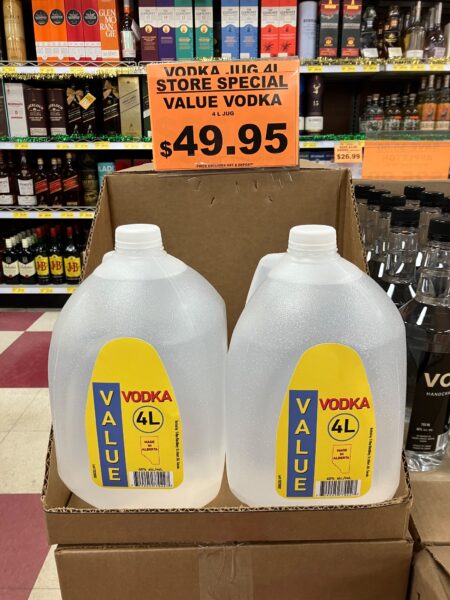
Lauren Boothby on Twit, er, I mean “X” – https://twitter.com/laurby/status/1776437318435422493/photo/1
The latest prude eruption comes from Alberta — Canada’s freedom capital, by some accounts. Over the weekend, Edmonton Journal reporter Lauren Boothby quite rightly informed her social-media followers of an extraordinary bargain she had discovered at Super Value Liquor in Edmonton’s Mill Woods neighbourhood: $49.99 for four litres of store-brand “Value Vodka”, produced at the T-Rex distillery in St. Albert, sold in a clear plastic jug, and labelled roughly as you might label a jug of vinegar or bleach (appropriately, per the vodka snobs on X).
“Alberta rules”, Boothby reported, and in many respects I agree.
Alas, a very Canadian scene then unfolded. Dale Nally, the minister responsible for Alberta Gaming, Liquor and Cannabis (ALGC), declared himself not OK with these vodka jugs. Not even slightly tolerant was Nally of these jugs; no sirree, Bob. He conceded the vodka was perfectly legal to sell — a minor but important detail — but claimed the jugs were somehow not in “compliance with … the spirit of Albertans”.
That’s not bad as an accidental pun, but you’ll notice that it’s absolutely meaningless as an explanation or justification for a policy. (Ironically, Nally is also Alberta’s minister responsible for eliminating red tape.) In my experience, when a politician or activist tells you something is against your society’s values or “spirit”, chances are they’re somewhere between 30 and 180 degrees wrong about it. I certainly tend to trust a distillery, a liquor store chain and the people of Alberta over a government minister on the question of whether there’s a market for cheap vodka.
Now to be fair, by any Canadian standard at least, Super Value Liquor is selling some astonishingly cheap hooch. Had someone other than a credible journalist posted that photo on X, I would have disbelieved my eyes. You can’t legally sell a four-litre vessel of vodka in Ontario for less than $144, and in practice it will cost you considerably more than that.
Ontario will always be the capital of Canadian prudery, but that’s almost three times as much! Canadian provinces have their policy and pricing discrepancies, but not many that big.
I’m all for reasonably cheap booze and a wide-open market in pretty much everything that doesn’t inherently harm other people. But in the wrong hands, certainly, alcohol does harm other people, in addition to its consumer. I wish it weren’t true, but it is. Curbing excessive alcohol consumption is a reasonable public-health goal that every serious government and opposition party in the developed world shares to some extent. And the simplest, most efficient and therefore most lucrative way for governments to accomplish that goal is through pricing.
(We’ll leave aside for now the howling conflict of interest inherent in governments selling alcohol — and casino gambling, lottery and sportsbooks, for heaven’s sake — while officially trying to dissuade people from partaking.)
March 17, 2024
Green Beer (You Suck at Cooking) Episode 87
You Suck At Cooking
Published Mar 17, 2019The history of Ireland is a long and storied one, and one I know next to nothing about. The history of St. Patrick is a short one, relative to the length of the history of the world. The current St. Patrick’s day celebrating has little or nothing to do with the actual St. Patrick, and that’s the way we like it.
The first step to making green beer is to add a few drops of food coloring, then add beer. When selecting a glass to drink it out of, make sure it’s transparent, that way you are able to see the green part of the beer not only from the top or from within the stomach, but also from the side while drinking beer.
While pouring the beer, making sure not to pour it from a great height. This will decrease the amount of bubbles that end up in the beer when you are drinking it, and therefore the enjoyment. If you were aware of the lengths that the manufacturers went to in order to get bubbles inside of that beer in the first place, you wouldn’t even drink it at all.
While drinking the beer, make sure you don’t allow the beer to come into contact with anything that could get stained, such as your clothes, dog, or mouth. If you swallow quickly enough you can keep your mouth from turning green permanently.
If you dislike drinking beverages that are colored green but want to get into the festive spirit, simply tape green construction paper around your drinking vessel, and dye your beer purple instead.
January 7, 2024
Evelyn Waugh’s horrible family
In the latest SHuSH newsletter, Ken Whyte explains why Evelyn Waugh drank:
Happy New Year! How were your holidays? Were you as festive as undergraduate Evelyn Waugh kicking off his Christmas break in 1924?
Then I went to Oxford. Drove to 31 St Aldates where I found an enormous orgy in progress. Billy and I unearthed a strap and whipped Tony. Everyone was hideously drunk except, strangely enough, myself. After a quiet day in cinemas, I had a dinner party of Claude, Elmley, Terence, Roger Hollis and a poor drunk called MacGregor. I arrived quite blind after a great number of cocktails at the George with Claude. Eventually the dinner broke up and Claude, Rogers Hollis and I went off for a pub crawl which after sundry indecorous adventures ended up at the Hypocrites where another blind was going on. Poor Mr McGregor turned up after having lain with a woman but almost immediately fell backwards downstairs. I think he was killed. Next day I drank all morning from pub to pub and invited to lunch with me at the New Reform John Sutro, Roger Hollis, Claude and Alfred Duggan. I ate no lunch but drank solidly and was soon in the middle of a bitter quarrel with the President — a preposterous person called Cotts — who expelled me from the club. Alfred and I then drank double brandies until I could not walk. He carried me to Worcester where I fell out of the window then relapsed into unconsciousness punctuated with severe but well directed vomitings. On Wednesday I lunched with Robert Byran at the New Reform and the man Cotts tried to throw me out again. Next day I lunched with Hugh and drank with him all the afternoon and sallied out with him fighting drunk at tea time when we drank at the New Reform till dinner… Next day, feeling deathly ill, I returned to London having spent two months’ wages. I had to dine with Alex, Richard Greene, Julia Strachey … and then back to Richard’s home for a drink. …
[…]
I picked up Alexander Waugh’s Fathers and Sons: The Autobiography of a Family (2004), several weeks ago. I’ve been enjoying it so much that I’m rationing it, reading about ten pages at a time to make it last.
Alexander Waugh is a music writer and biographer, former opera critic at the Evening Standard, son of novelist and Private Eye diarist Auberon Waugh, grandson of the aforementioned Evelyn, the titan of English letters whose brother, Alec, and father, Arthur, were also reasonably famous writers. The book is about the interpersonal relations of these three generations of men who produced about 180 books among them. And it’s wild. These are hugely and incorrigibly flawed people. Often horrible to one another (also to outsiders but they save their best for kin). They are in equal parts perverse and hilarious, and often brilliant, especially Evelyn. I can’t believe people ever behaved this way.
Undergraduates have never required reasons to binge drink, but you can’t read the opening chapters of Fathers and Sons without thinking Evelyn had special motivation. He was the second son of Arthur. His older brother, Alec, was “the firstling”, the “future head of the family”, their parents’ “darling lamb”, and mom and pop didn’t care who knew it, least of all Evelyn.
Arthur and his missus, Kate, had an “unbounded fascination for Alec”, who won all his school honours and was star of the cricket team. Arthur considered the boy a literal gift from God and believed that they could communicate telepathically. He would write him notes like: “I simply go about thinking of your love for me all the time”. Their relationship, writes Alexander, was “hot, clammy and compulsive”, and to the “objective eye their behavior might have resembled a pair of star-crossed teenage lovers”. Indeed, it was romantic in all but the physical sense — Arthur saved his sexual depredations for girls of tender age with whom he played “tickling games” (he also had a fetish involving young women and bicycles).
In addition to being second born, Evelyn made the mistake of being male. His parents had wanted a daughter; they consoled themselves by giving him an effeminate name and dressing him in bonnets and frills long beyond the standard of the day. He was said to be a “warm, bright. sweet-natured and affectionate child”, at least until an awareness of the family dynamic dawned. In Edwardian terms, he was treated as a bastard child by his legitimate parents. His possessions were hand-me-downs. He attended the less expensive school. When eleven-year-old Evelyn asked for a bicycle, his parents bought a bigger and better one for Alec. When Alec asked for a billiard table, space was found for it in Evelyn’s room. Despite winning prizes and becoming head of his house in school, and president of the debating society, and editor of the school magazine, Evelyn remained an afterthought and something of a nuisance in the minds of his Alec-obsessed parents.
Evelyn responded to his circumstances in a clever and self-protective fashion, defining himself against his brother and father. By adolescence, he had an inkling that he was smarter and funnier than both. They could keep their mawkish outpourings of emotion toward one another; he would be hard of head and sharp of tongue. By his early teen years, he was confiding to his diary that Arthur was a fat and “ineffably silly” Victorian sentimentalist. He considered both Alec and Arthur philistines. “Terrible man, my father”, Evelyn said to a schoolmaster. “He likes Kipling.”
To the extent that his parents thought about Evelyn, they were disturbed by his dark moods and lassitude, and intimidated by his cynical wit. Both Alec and Arthur were threatened by Evelyn as a potential literary rival. When Evelyn, in what was becoming a typical act of rebellion, ran up an expensive restaurant tab and had it sent to an outraged Arthur, Alec said: “You know father, if Evelyn turns out to be a genius, you and I might be made to look very foolish by making a fuss over ten pounds, seventeen and ninepence.”
So you can perhaps see how young Evelyn Waugh developed an enthusiasm for drink remarkable even in an undergrad, and why the rare characters killed in gruesome fashion in his fiction tended to be fathers.

